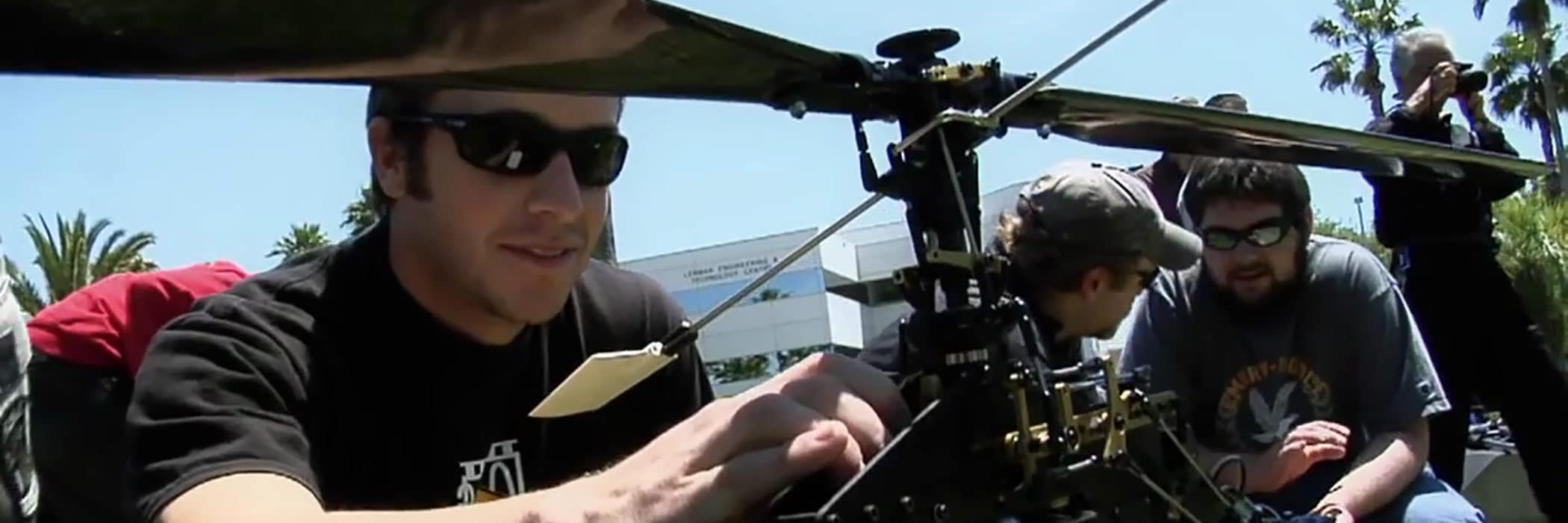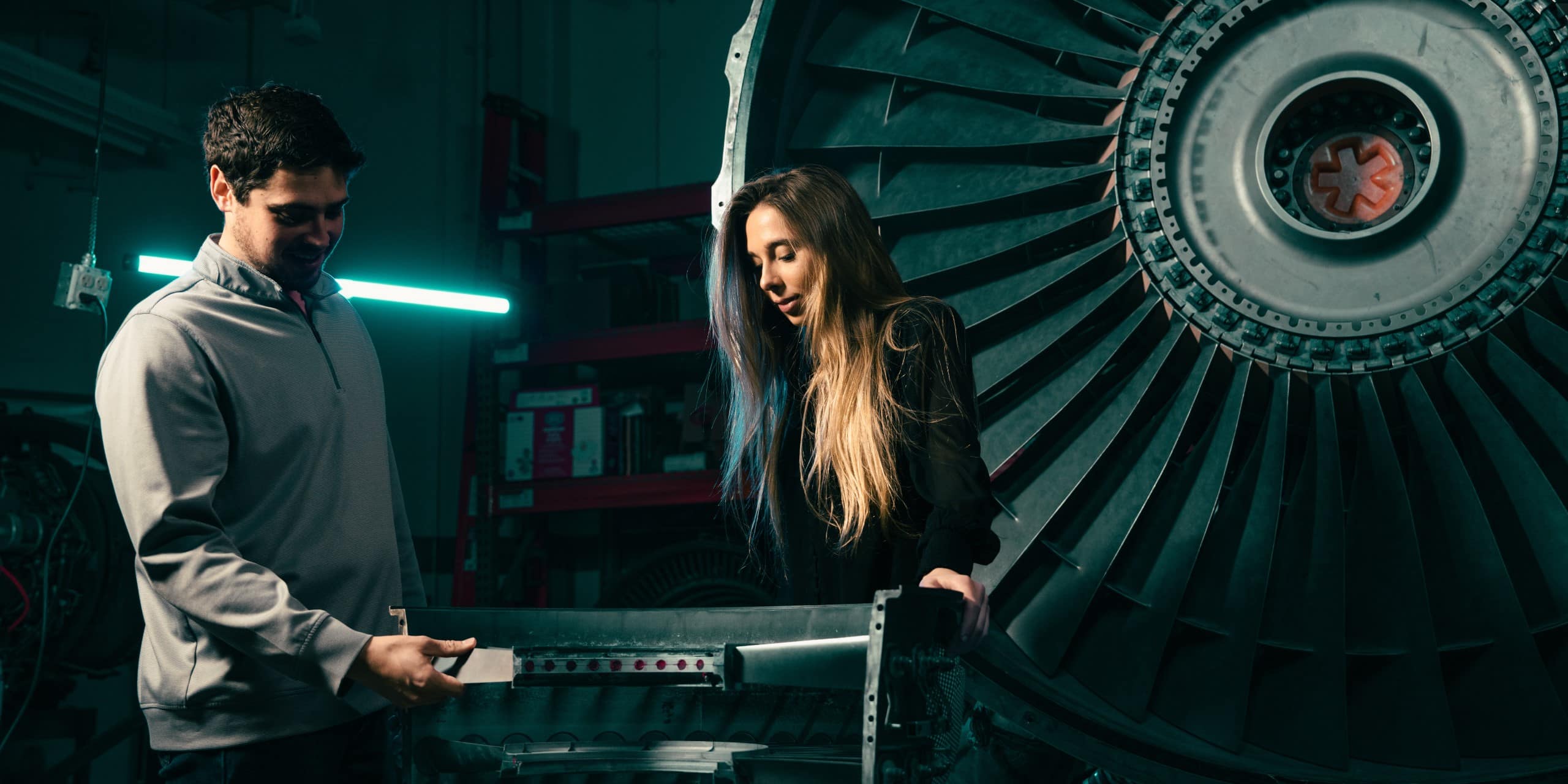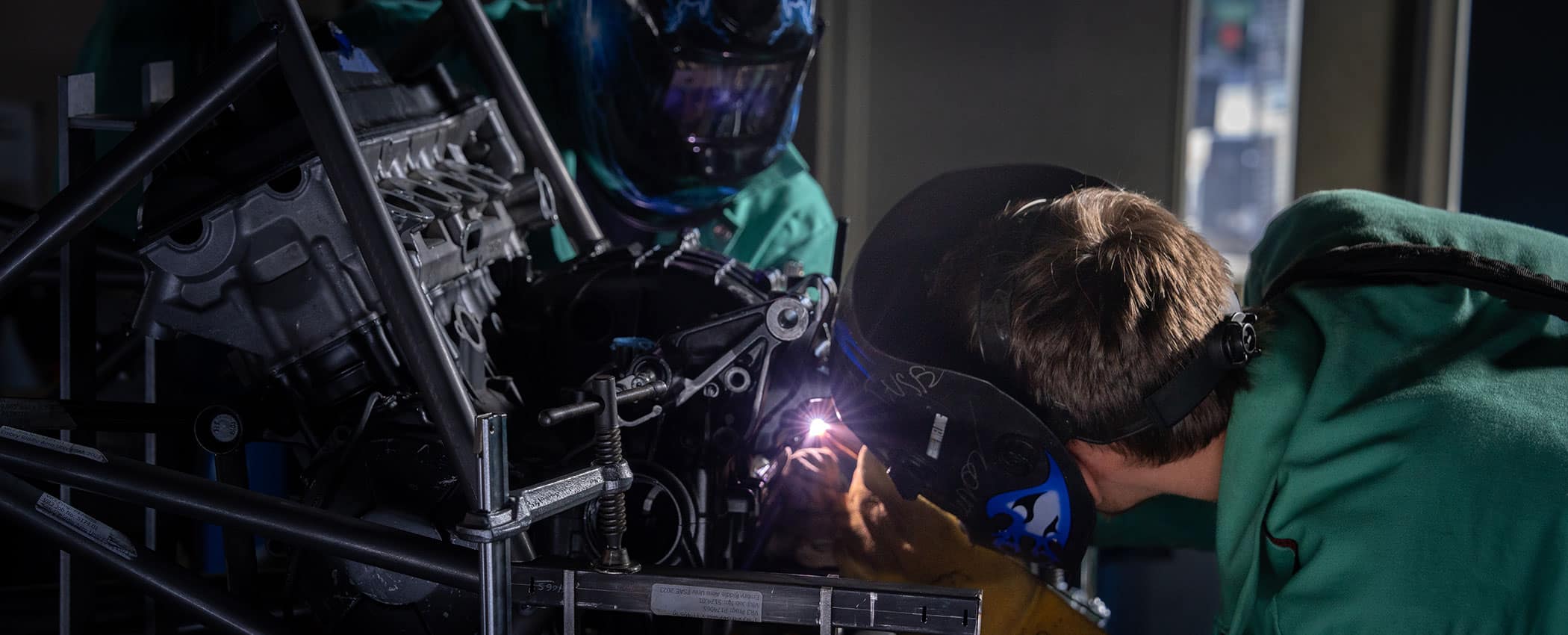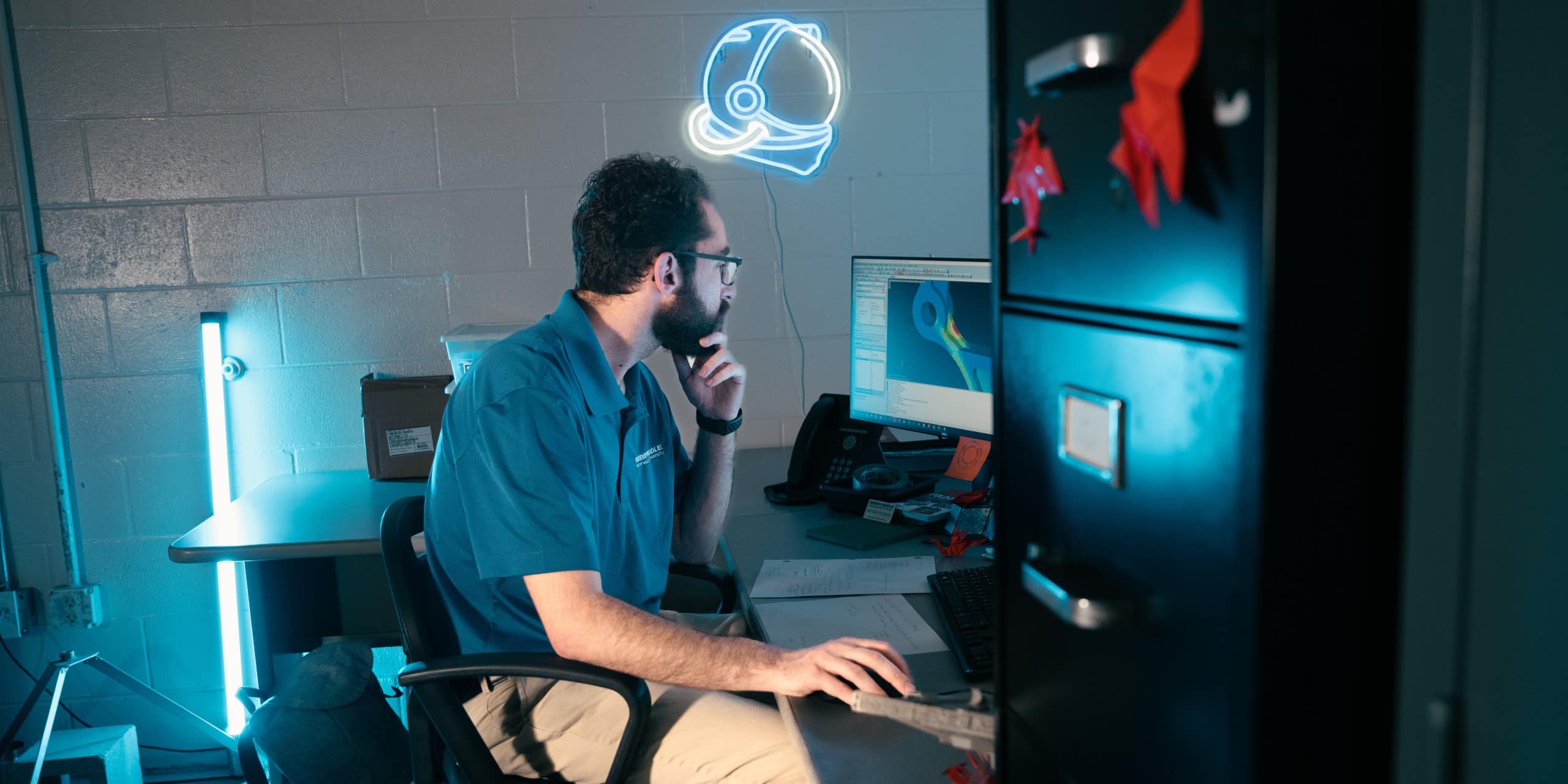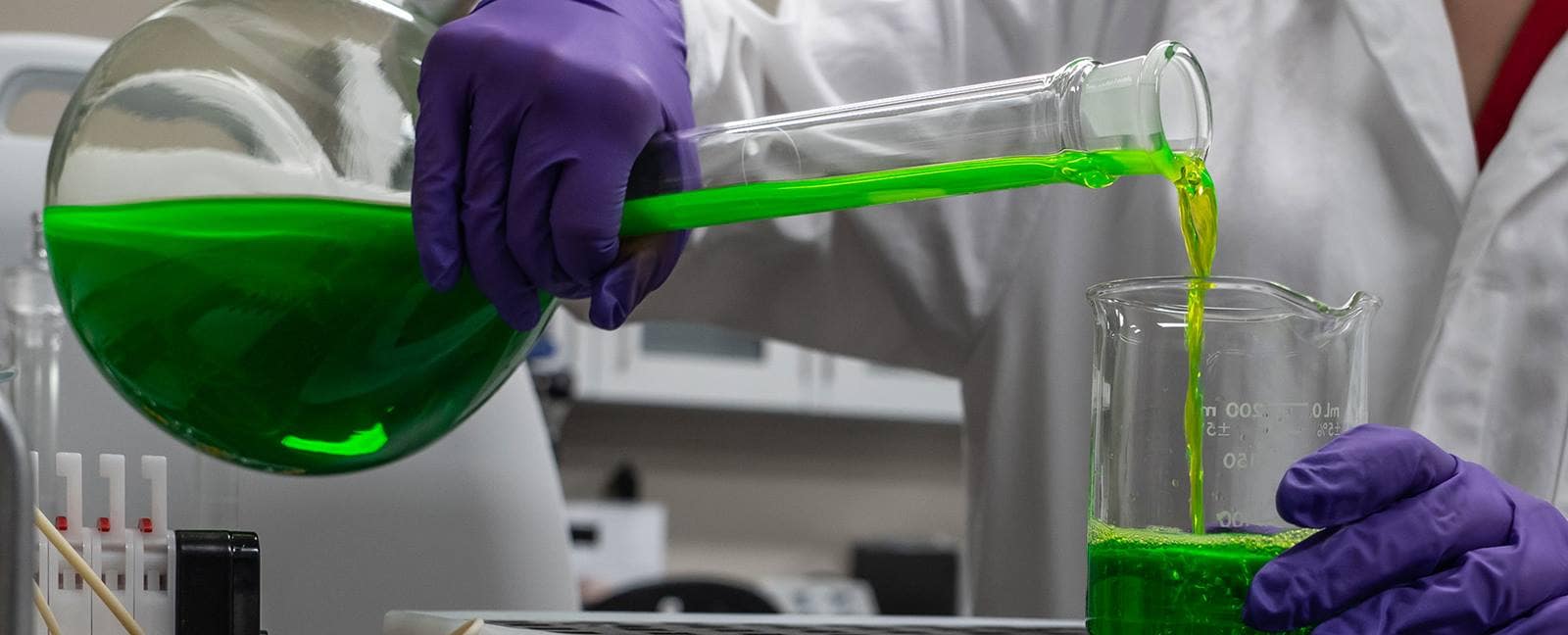
Bachelor of Science in
Civil Engineering
Embry-Riddle’s high-technology atmosphere gives students the engineering foundation they need to help reshape the future in a range of global industries.
Pursuing a Bachelor of Science in Civil Engineering degree at Embry-Riddle means students benefit from ERAU’s high-technology atmosphere, offering unique hands-on opportunities whether they pursue a civil engineering career in transportation, aerospace, or elsewhere. This program provides the foundation necessary to pass the Fundamentals of Engineering exam and become a professional engineer.
The demand for civil engineers educated in the fields of airports, transportation, aviation and aerospace planning, and analysis and design is strong and is expected to grow rapidly in the future. Space utilization and exploration initiatives are certain to produce further demand for civil engineers with aerospace interests.
Civil Engineering graduates are sought-after candidates for jobs in many fields, including airport design and construction, roadway infrastructure, alternative energy development, municipal systems, and more.
A Civil Engineer can work in just about any populated part of the planet. Graduates are not limited to following an industry; every municipality employs Civil Engineers, for example.
Students have the opportunity to participate in the American Society of Civil Engineers (ASCE), Institute of Transportation Engineers (ITE) and Engineers Without Borders (EWB) chapters, complete a senior design project, and explore opportunities in research.
The Civil Engineering program is accredited by the Engineering Accreditation Commission of ABET, www.abet.org, under the General Criteria and the Civil Engineering Program Criteria.
DETAILS
About Civil Engineering at the Daytona Beach, FL Campus
Housed in the Civil Engineering Department of the College of Engineering, the B.S. in Civil Engineering program gives students the tools they need to make an impact in tomorrow’s world, engineering transportation networks, and other infrastructure.
The program takes advantage of ERAU’s advanced technological capabilities to give students the following unique opportunities:
- Students begin this program by completing the College of Engineering’s Freshman Engineering Program. The program includes a general education core of Speech and College Success, introductions to engineering and computing, plus courses in calculus, analytical geometry, and physics for engineers.
- There is an option for students to develop personal study programs in topics ranging from hurricane and wind engineering to energy conservation, green engineering, and even designing extraterrestrial habitations.
- Graduates of the Civil Engineering program will leave ERAU with an understanding of the classical areas of civil engineering with emphasis on transportation, geotechnical, environmental, and structural design in aviation and aerospace fields developed through a carefully planned series of courses and laboratories.
Professional Accreditation
The Bachelor of Science in Civil Engineering is accredited by the Engineering Accreditation Commission of ABET, under the commission’s General Criteria and Program Criteria for Civil and Similarly Named Engineering Programs.
Details about Program Educational Outcomes, Student Learning Outcomes and Enrollment Data can be found on our Civil Engineering Program Accreditation Information page.
Embry-Riddle offers combined and accelerated degree programs that allow well-qualified students the chance to begin graduate work in a master's program while finishing their bachelor's degree. Learn more about our Combined and Accelerated Degree Programs.
Student Learning Outcomes
Students will:
- Have an ability to to identify, formulate, and solve complex engineering problems by applying principles of engineering, science, and mathematics.
- Have an ability to apply engineering design to produce solutions that meet specified needs with consideration of public health, safety, and welfare, as well as global, cultural, social, environmental, and economic factors.
- Have an ability to communicate effectively with a range of audiences.
- Have an ability to recognize ethical and professional responsibilities in engineering situations and make informed judgments, which must consider the impact of engineering solutions in global, economic, environmental, and societal contexts.
- Have an ability to function effectively on a team whose members together provide leadership, create a collaborative and inclusive environment, establish goals, plan tasks, and meet objectives.
- Have an ability to develop and conduct appropriate experimentation, analyze and interpret data, and use engineering judgment to draw conclusions.
- Have an ability to acquire and apply new knowledge as needed, using appropriate learning strategies.
- Have an ability to generate engineering drawings using modern graphical tools common to civil engineering.
General Education Requirements
For a full description of Embry-Riddle General Education guidelines, please see the General Education section of this catalog. These minimum requirements are applicable to all degree programs.
| Communication Theory & Skills (COM 122, COM 219, COM 221) | 9 | |
| Lower-Level Humanities | 3 | |
| Lower-Level Social Sciences | 3 | |
| Lower or Upper-Level Humanities or Social Sciences | 3 | |
| Upper-Level Humanities or Social Sciences | 3 | |
| Computer Science (EGR 115) | 3 | |
| Mathematics (MA 241 & MA 242) | 8 | |
| Physical and Life Sciences (PS 150, PS 160 & BIO 120L OR PS 224L) | 7 | |
| Total Credits | 39 | |
| Program Requirements | ||
| UNIV 101 | College Success | 1 |
| Mathematics | ||
| MA 243 | Calculus and Analytical Geometry III | 4 |
| MA 345 | Differential Equations and Matrix Methods | 4 |
| MA 412 | Probability and Statistics | 3 |
| Physical Science | ||
| CHM 110 | General Chemistry I | 3 |
| CHM 110L | General Chemistry I Laboratory | 1 |
| BIO 120 | Foundations of Biology I | 3 |
| or GEO 215 | Introduction to Geoscience | |
| or PS 224 | Astronomy | |
| Civil Engineering Core | ||
| CIV 140 | Engineering Measurements | 1 |
| CIV 140L | Engineering Measurements Laboratory | 1 |
| CIV 222 | Introduction to Environmental Engineering | 3 |
| CIV 304 | Structural Analysis | 3 |
| CIV 307 | Civil Engineering Materials I | 3 |
| CIV 307L | Civil Engineering Materials I Laboratory | 1 |
| CIV 311 | Introduction to Transportation Engineering | 3 |
| CIV 320 | Soil Mechanics | 3 |
| CIV 320L | Soil Mechanics Laboratory | 1 |
| CIV 437 | Water Resources and Hydrology | 3 |
| CIV 471 | Senior Design Preliminary Design | 3 |
| CIV 481 | Senior Design Final Design | 4 |
| CIV 490 | The Civil Engineering Profession | 1 |
| Engineering Core | ||
| EGR 101 | Introduction to Engineering | 2 |
| EGR 120 | Graphical Communications | 3 |
| ES 201 | Statics | 3 |
| ES 202 | Solid Mechanics | 3 |
| ES 204 | Dynamics | 3 |
| ES 309 | Fluid Dynamics | 3 |
| Civil Environmental Engineering Elective | ||
| CIV 415 | Sustainable Food Production and Aquaponics | 3 |
| or CIV 417 | Air Pollution | |
| or CIV 499 | Directed Design Project | |
| Civil Engineering Electives | 9 | |
| Transportation Electives | ||
| CIV 330 | Computer Applications in Transportation | 3 |
| or CIV 443 | Traffic Data Collection Method and Computer Application in Traffic Engineering | |
| or CIV 447 | Airport Design I | |
| or CIV 457 | Airport Design II | |
| or CIV 499 | Directed Design Project | |
| Geotechnical Elective | ||
| CIV 421 | Geotechnical and Foundation Engineering | 3 |
| or CIV 422 | Design of Pavement Structures | |
| or CIV 424 | Rehabilitation of Pavement Structures | |
| or CIV 499 | Directed Design Project | |
| Structures Elective | ||
| CIV 431 | Reinforced Concrete Design | 3 |
| or CIV 432 | Structural Steel Design | |
| or CIV 499 | Directed Design Project | |
| Technical Elective | 3 | |
| Total Credits | 90 | |
| Total Degree Credits | 129 | |
Suggested Plan of Study
Students should be aware that several courses in each academic year may have prerequisites and/or corequisites. Check the course descriptions at the back of this catalog before registering for classes to ensure requisite sequencing.
See the Common Year One outline in the Engineering Fundamentals Program Introduction.
| Year One | ||
|---|---|---|
| Credits | ||
| See the Common Year One outline in the College of Engineering introduction. | 33 | |
| Credits Subtotal | 33.0 | |
| Year Two | ||
| BIO 120 | Foundations of Biology I | 3 |
or GEO 215
|
Introduction to Geoscience | |
or PS 224
|
Astronomy | |
| BIO 120L | Foundations of Biology I Laboratory | 1 |
or PS 224L
|
Introductory General Astronomy Laboratory | |
| CIV 140 | Engineering Measurements | 1 |
| CIV 140L | Engineering Measurements Laboratory | 1 |
| CIV 222 | Introduction to Environmental Engineering | 3 |
| COM 221 | Technical Report Writing | 3 |
| ES 201 | Statics | 3 |
| ES 202 | Solid Mechanics | 3 |
| MA 243 | Calculus and Analytical Geometry III | 4 |
| MA 345 | Differential Equations and Matrix Methods | 4 |
| PS 160 | Physics for Engineers II | 3 |
| Credits Subtotal | 29.0 | |
| Year Three | ||
| CIV 304 | Structural Analysis | 3 |
| CIV 307 | Civil Engineering Materials I | 3 |
| CIV 307L | Civil Engineering Materials I Laboratory | 1 |
| CIV 311 | Introduction to Transportation Engineering | 3 |
| CIV 320 | Soil Mechanics | 3 |
| CIV 320L | Soil Mechanics Laboratory | 1 |
| Civil Structures Elective | 3 | |
| COM 219 | Speech | 3 |
| ES 204 | Dynamics | 3 |
| Civil Environmental Engineering Elective | 3 | |
| Civil Transportation Elective | 3 | |
| Humanities or Social Sciences Lower-Level or Upper-Level Elective | 3 | |
| Credits Subtotal | 32.0 | |
| Year Four | ||
| CIV 437 | Water Resources and Hydrology | 3 |
| CIV 471 | Senior Design Preliminary Design | 3 |
| CIV 481 | Senior Design Final Design | 4 |
| CIV 490 | The Civil Engineering Profession | 1 |
| MA 412 | Probability and Statistics | 3 |
| ES 309 | Fluid Dynamics | 3 |
| Civil Geotechnical Elective | 3 | |
| Civil Engineering Electives | 9 | |
| Humanities or Social Sciences Upper-Level Elective | 3 | |
| Technical Electives | 3 | |
| Credits Subtotal | 35.0 | |
| Credits Total: | 129.0 | |
Course List
| Civil Transportation Electives | ||
| CIV 330 | Computer Applications in Transportation | 2 |
| CIV 443 | Traffic Data Collection Method and Computer Application in Traffic Engineering | 3 |
| CIV 447 | Airport Design I | 3 |
| CIV 457 | Airport Design II | 3 |
| CIV 499 | Directed Design Project | 1-6 |
| Civil Structures Electives | ||
| CIV 431 | Reinforced Concrete Design | 3 |
| CIV 432 | Structural Steel Design | 3 |
| CIV 499 | Directed Design Project | 1-6 |
| Civil Geotechnical Electives | ||
| CIV 421 | Geotechnical and Foundation Engineering | 3 |
| CIV 422 | Design of Pavement Structures | 3 |
| CIV 424 | Rehabilitation of Pavement Structures | 3 |
| CIV 499 | Directed Design Project | 1-6 |
| Civil Environmental Electives | ||
| CIV 415 | Sustainable Food Production and Aquaponics | 3 |
| CIV 417 | Air Pollution | 3 |
| CIV 499 | Directed Design Project | 1-6 |
| Technical Electives | ||
| All CIV courses are acceptable. Other courses are to be selected from an approved list of courses maintained by the Civil Engineering program coordinator. | ||
| Up to 3 credits of Co-operative education may be used as Technical elective credits with department or Co-op advisor approval. | ||
Get Started Now:
Summary
129 Credits
Estimate your tuition by using the Tuition Calculator
View Financial Aid Information
Learn about our General Education
Find out about transferring credits to this degree
Learn more about our Veterans & Military benefits
View our Academic Calendar
